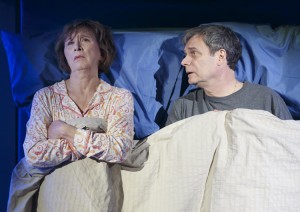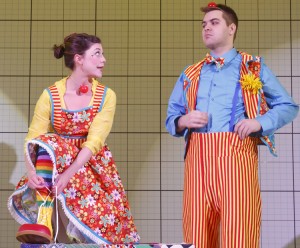Few playwrights have been so attuned to their times as British dramatist Caryl Churchill. She became an international name in 1979 with Cloud 9 and its examination of sexual politics, and since then she has reflected the winds of change in plays such as Far Away (2000; governmental oppression), Serious Money (1987; financial shenanigans), A Number (2002; cloning), and Seven Jewish Children — A Play for Gaza (2009; oppression of Palestinians), not to mention Top Girls (1982), in which she explored American vs. British feminism.

Her newest play, Love and Information, is a challenging experimental work, a random mosaic of scenes, vignettes, and snippets, the longest perhaps two or three minutes, the shortest only about 20 seconds long. Together the bits and bytes of dialogue give a sense of foreboding about the Digital Age. By the end of the intermissionless two hours the twin subjects of her title seem on uneven ground: one feels that information has the upper hand and is overwhelming the emotional well-being of all the characters.
Under the direction of James MacDonald, a cast of 15, including Maria Tucci, James Waterston, Jennifer Ikeda, and Randy Danson, give brief life to multiple personalities, none of whom appears more than once. (At least not noticeably so; Churchill’s script indicates a couple places where there might be overlap.) Racially diverse, they include people from all walks of life in various situations: teen girls at a sleepover swooning over the star of a boy band; two picnickers discussing scientific experiments on baby chicks; seatmates on an airplane; musicians; spinners at a gym; a couple in bed; boys camping under a starry sky; and a savant who can recall weather and incidents on random days from the past, among many others. The scenes are played out in a square white box with walls and ceilings decorated in grids of black and blue lines, and each ends with a blackout.
For many of the scenes, designer Miriam Buether provides a major set piece, from the gym equipment to a patio table with a large orange umbrella to beds, chairs and sofas of various descriptions. There are also smaller elements: a baby carriage, a cello case, children’s toys, and a Babar book. The result is a panorama of modern life. Gabriel Berry and Andrea Hood’s costumes encompass winter gear (though perhaps none so warm as are needed this winter!) to summer shorts and swimsuits. Christopher Shutt’s sound design sets up each of the scenes (they all comprise seven portions, perhaps suggesting days of the week, and an epilogue): the sounds of children at play, classical music, motorcycles, and cats meowing relate to the topic or situation of the next interaction.
 The primary challenge is that Churchill’s play doesn’t have a conflict or an arc or any traditional dramatic structure. Its effect comes from the accretion of details, as characters talk about everything under the sun, e.g., mathematics, science, getting together with annoying friends, redacting government documents, and words that mean “table.” The nontraditional form may alienate some viewers, and it requires close attention to sift a “message,” as in this brief exchange between a couple:
The primary challenge is that Churchill’s play doesn’t have a conflict or an arc or any traditional dramatic structure. Its effect comes from the accretion of details, as characters talk about everything under the sun, e.g., mathematics, science, getting together with annoying friends, redacting government documents, and words that mean “table.” The nontraditional form may alienate some viewers, and it requires close attention to sift a “message,” as in this brief exchange between a couple:
“What sex evolved to do is get information from two sets of genes so you get offspring that’s not identical to you. Otherwise you just keep getting the same thing over and over again like hydra or starfish. So sex essentially is information.”
“You don’t think that while we’re doing it, do you?”
“It doesn’t hurt to know it. Information and also love.”
Later on, a gay man receives a bouquet of red roses from his lover and he begins to gush with emotion in the form of information: “it means stop and of course it means go because it’s the color of energy and red cars have the most accidents because people are excited by red or people who are already excited like to have red.” He notes that “in China red is lucky.” But his information overload simply obscures the point of the roses: someone loves him. The flood of data that one has to process in our current world, Churchill intimates, is driving us further and further apart, until, she suggests, we will be left with only information and have lost our humanity.
The regular performance schedule for Love and Information is Tuesday and Wednesday at 7.p.m.; Thursday and Friday at 8 p.m.; Saturday at 3 and 8 p.m.; and Sunday at 2 and 7 p.m. There will be a special student matinee on March 19. Orchestra tickets are $85, and mezzanine tickets are $65. They may be purchased online at nytw.org or by phoning Ticketmaster at 800-982-2787, or in person at the Minetta Lane Theater box office, 18 Minetta Lane.
 The primary challenge is that Churchill’s play doesn’t have a conflict or an arc or any traditional dramatic structure. Its effect comes from the accretion of details, as characters talk about everything under the sun, e.g., mathematics, science, getting together with annoying friends, redacting government documents, and words that mean “table.” The nontraditional form may alienate some viewers, and it requires close attention to sift a “message,” as in this brief exchange between a couple:
The primary challenge is that Churchill’s play doesn’t have a conflict or an arc or any traditional dramatic structure. Its effect comes from the accretion of details, as characters talk about everything under the sun, e.g., mathematics, science, getting together with annoying friends, redacting government documents, and words that mean “table.” The nontraditional form may alienate some viewers, and it requires close attention to sift a “message,” as in this brief exchange between a couple:

